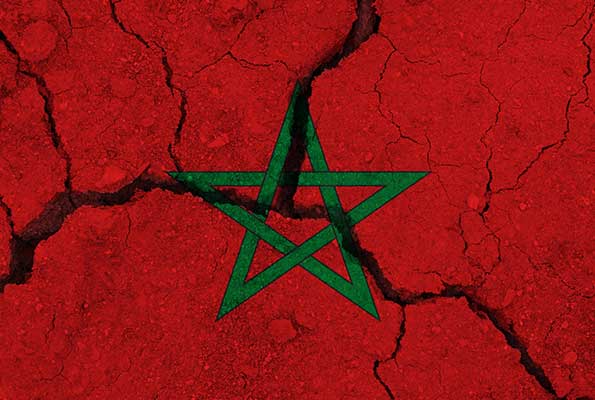The World Bank has warned that drought and other unfavourable weather conditions will likely result in another year of subpar cereal production in Morocco and may cause the country’s economic development to fall short of expectations.
In April 2023, the Moroccan Ministry of Agriculture said that the country’s projected cereal production for the 2023 harvest is 55.1 million quintals, up 62% over 2022. Quintals weigh 100 kilograms each.
The figure worries Javier Diaz Cassou, senior lead economist at the World Bank. According to estimates, the yield from last year was 34 million quintals.
“This would undoubtedly be a considerable improvement over that crop,” Cassou said to Al-Monitor. The historical average for Morocco, which is somewhere in the range of 70–75 million quintals, is still far below this tally.
“In other words, continuously unfavourable climatic conditions will lead to yet another rather subpar agricultural season this year, which might drive GDP growth below the estimates that the majority of analysts advanced at the start of the year,” Cassou continued.
The Maghreb endured one of its worst droughts in 2022, which led to a 60% decrease in Moroccan cereal production.
Early in May, the Ministry of Agriculture declared that the annual rainfall had increased by 13% to 207 millimetres for 2023, up from 184 millimetres in 2022, according to a report from Morocco World News at the time.
Despite a rise in cereal production for 2023, the economist predicted that Morocco’s production would still fall short of meeting domestic demand, necessitating a sizable amount of imports.
According to the National Ports Agency, Morocco imported over 8.8 tons of cereal in 2022, up 23.2% from 2021. According to the report, “unfavourable weather circumstances” were to blame for the rise in imports.
Cassou stated in a discussion of domestic cereal pricing in Morocco that “the evolution of cereal prices in international markets will remain a major factor in defining domestic prices (except for soft wheat, whose price is regulated by the state), and here recent trends are more positive.”
In fact, according to FAO data, international cereal prices have been on a downward trend for several months, having dropped by over 21% from their peak shortly after the beginning of the Ukraine war. This pattern ought to lessen some of the pressure on domestic prices.
A Deadly Dilemma
Water shortages have hit the Middle East and North Africa hardest. Twelve of the 17 countries with “extremely high” water stress are in this region, while seven have “high” water stress.
Socioeconomic conditions render the Maghreb susceptible. Protests have erupted against poor administration, economic depression, and youth unemployment. Morocco in 2011 and Tunisia in 2014 specifically codified a right to water in their constitutions, increasing the likelihood that water scarcity and equity may become political issues.
North Africa’s water use climbed 346% in Algeria, 337% in Libya, and 240% in Tunisia from 1962 to 2017. All three national gains were among the 15 largest internationally.
Morocco may have handled this issue better than its neighbours, improving food and economic security through agricultural expansion while increasing water withdrawals by 12% since 1977. Morocco forecasts “absolute water scarcity” (less than 500 cubic meters per person per year) by 2030. Morocco has seen parched protests in the south due to water cutoffs, but fewer domestic upheavals than its North African neighbours.
As the Ukraine war shows, this dependency exposes Morocco to external price shocks. About 12% of the population lives just above the poverty line, and middle-class households spend 40% of their income on food. These figures demonstrate that even small price shocks can significantly impact household consumption. Government subsidies have shielded citizens from rising food prices, but this cannot last.
The water shortage, long considered a zero-sum issue with food production, has received little attention in the face of rising food prices. Water resources and environmental deterioration are key challenges in the Generation Green Plan, but agricultural development comes first.
The government-affiliated Economic, Social, and Environmental Council noted studies showing current water use practices and climate change could cause Morocco to lose 80% of its water supplies by 2045. The council warns of increasing aquifer depletion, which Morocco has relied on for agricultural expansion. Seawater intrusion, nitrate pollution from fertilizers or sewage, and natural salt increases have deteriorated aquifers, causing alarming drops. Due to their sluggish recharge rate, these aquifers’ depletion and pollution would harm Morocco’s economy.
The Way Forward
Morocco has traded food security and economic growth for sustainable water management. This is a dangerous exchange. Water shortages will limit economic growth and hike food costs as climate change worsens structural droughts and over-farming pressures water supplies. Dissatisfaction with the administration and irregular migration will deepen social and political instability.
Changing national policy is essential. Morocco has built the world’s largest desalination plant and dams to store water. By improving food supply chain efficiency, Morocco can reduce over-farming and food insecurity.
Moroccan crops have lost genetic diversity, especially local species most suited to changing climates, but Tunisian farmers and NGOs have sought to restore them. Moroccan farmers can emulate this trend.
Integrating national, regional, and local programs and perspectives will be difficult. By combining grassroots programming with national policymaking, the Maghreb may avoid costly zero-sum thinking and build a better future.



